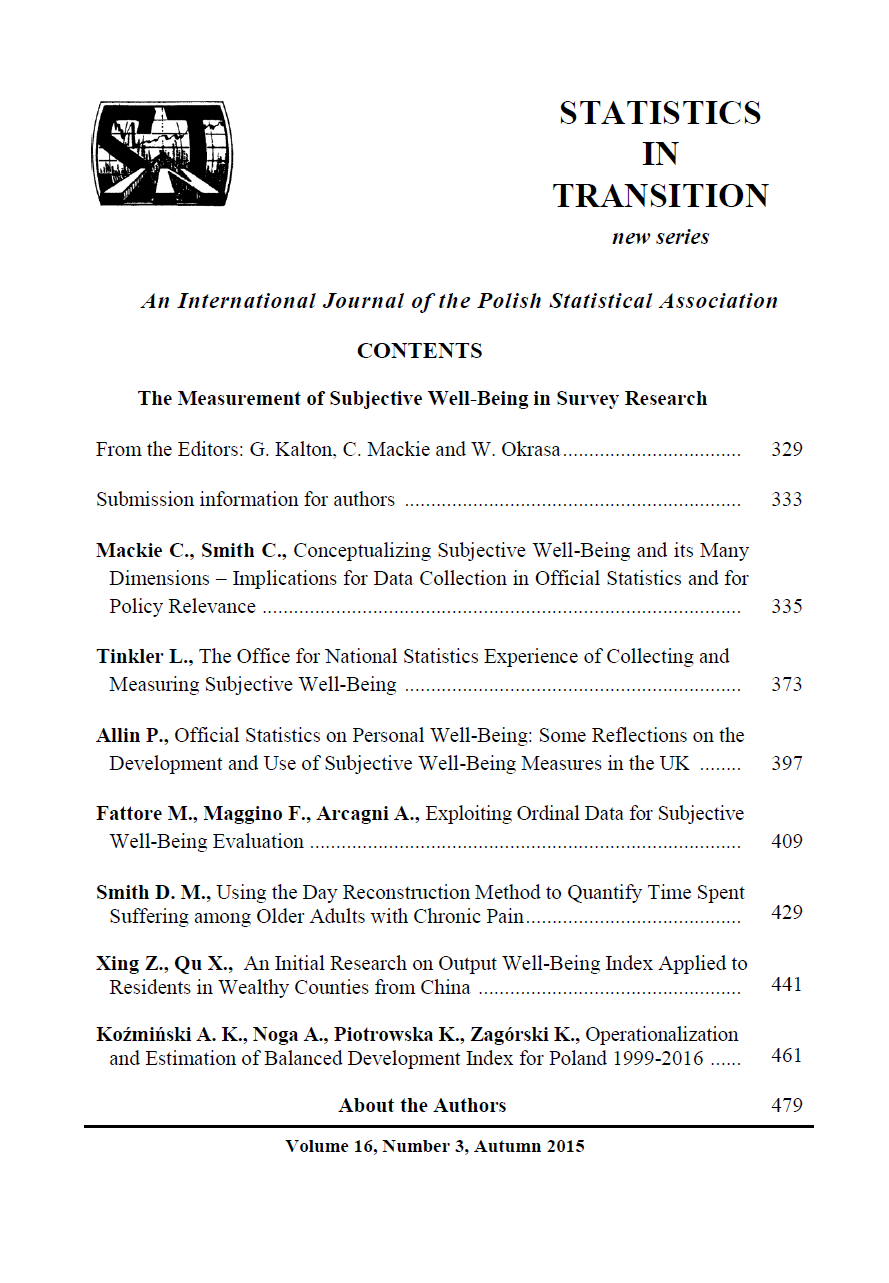ARTICLE
ABSTRACT
The Day Reconstruction Method (DRM) is a structured diary designed to measure time use in a manner that is more valid than traditional written summary measures, but less burdensome than real-time electronic diary methods. The lower respondent burden and administration costs might make it feasible to utilize this method in large national surveys. Past studies using the DRM have generally focused on subjective mood states during different types of activities. In this study, we extended the DRM to also measure suffering from negative symptoms, such as pain and fatigue, in 122 older adults, most of whom suffer from chronic pain. Results indicated that the method was well tolerated in this population, with over 98% of the sample providing interpretable responses. Chronic pain respondents reported spending a considerable proportion of their day suffering from pain, fatigue, and depression; a much higher proportion than reported by healthy controls (p’s < .01). Time spent suffering was associated with lower income, negative mood, and lower life satisfaction and quality of life.
KEYWORDS
quality of life measurement, osteoarthritis, time-weighted experience.
REFERENCES
BELLAMY, N., BUCHANAN, W. W., GOLDSMITH, C. H., CAMPBELL, J.,STITT, L. W.,(1988). Validation study of WOMAC: A health status instrument for measuring clinically important patient relevant outcomes to antirheumatic drug therapy in patients with osteoarthritis of the hip or knee. The Journal of Rheumatology, 15, 1833-1840.
DIENER, E., EMMONS, R. A., LARSEN, R. J., GRIFFIN, S.,(1985). The Satisfaction With Life Scale. Journal of Personality Assessment, 49, 71-75.
DIENER, E., SUH, E. M., LUCAS, R. E., SMITH, H. L.,(1999). Subjective well being: Three decades of progress. Psychological Bulletin, 125, 276-302.
DOLAN, P.,(2008). Developing methods that really do value the ‘Q’ in the QALY. Health Economics, Policy and Law, 3, 69-77.
FOLSTEIN, M., FOLSTEIN S. E., MCHUGH, P. R., (1975). "Mini-mental state." A practical method for grading the cognitive state of patients for the clinician. J Psychiatr Res, 12, 189-198.
KAHNEMAN, D., KRUEGER, A., SCHKADE, D., SCHWARZ, N.,STONE, A. A.,(2004a). Toward National Well-Being Accounts. AEA Papers and Proceedings, 94, 429-434.
KAHNEMAN, D., KRUEGER, A. B., SCHKADE, D., SCHWARZ, N., STONE, A. A.,(2004b). A survey method for characterizing daily life experience: The day reconstruction method (DRM). Science, 306, 1776-1780.
KIM, J., KIKUCHI, H., YAMAMOTO, Y.,(2013). Systematic comparison between ecological momentary assessment and day reconstruction method for fatigue and mood states in healthy adults. British Journal of Health Psychology, 18, 155-167.
KRUEGER, A. B., KAHNEMAN, D., SCHKADE, D., SCHWARZ, N., STONE, A. A.,(2009). National Time Accounting: The Currency of Life. In: KRUEGER, A. B. (ed.) Measuring the Subjective Well-Being of Nations: National Accounts of Time Use and Well-Being. Chicago: University of Chicago Press.
KRUEGER, A. B., STONE, A. A.,(2008). Assessment of Pain: A community based diary survey in the USA. The Lancet, 371, 1519-1525.
ROBINSON, M. D., CLORE, G. L.,(2002). Episodic and semantic knowledge in emotional self-report: Evidence for two judgment processes. Journal of Personality and Social Psychology, 83, 198-215.
SCHWARZ, N., STRACK, F.,(1999). Reports of subjective well-being: judgmental processes and their methodological implications. In: KAHNEMAN, D., DIENER, E., SCHWARZ, N. (eds.) Well-Being The foundations of hedonic psychology. New York.
SHIFFMAN, S., STONE, A. A.,(1998). Ecological momentary assessment: A new tool for behavior medicine research. In: KRANTS, D. S. (ed.) Technology and Methods in Behavioral Medicine. Mahwah: Lawrence Erlbaum Associates.
SMITH, D. M.,(2011). Measures of time-use and well-being in survey research. Forum for Health Economics and Policy, 14, 1-14.
SMITH, D. M., BROWN, S. L., UBEL, P. A.,(2008). Mispredictions and misrecollections: Challenges for subjective outcome measurement. Disability and Rehabilitation, 30, 418-424.
STONE, A. A., MACKIE, C., (eds.),(2013). Subjective Well-Being: Measuring Happiness, Suffering, and Other Dimensions of Experience, Washington, D.C.: The National Academies Press.
WATSON, D., CLARK, L. A., TELLEGEN, A.,(1988). Development and validation of brief measures of positive and negative affect: The PANAS scales. Journal of Personality & Social Psychology, 54, 1063-1070
